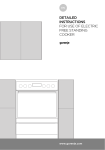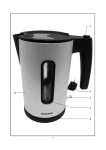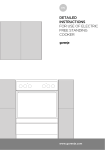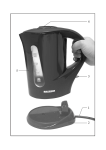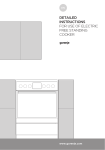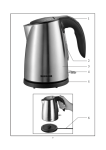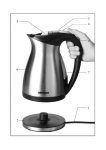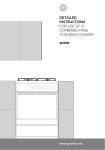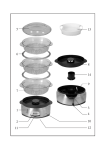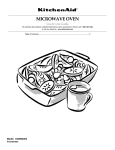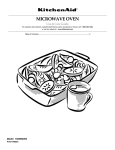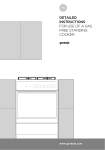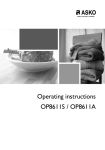Download Gorenje BOP747S32X
Transcript
EN DETAILED INSTRUCTIONS OF THE ELECTRIC PYROLYTIC OVEN www.gorenje.com We thank you for your trust and the purchase of our appliance. This detailed instruction manual is supplied to make the use of this product easier. The instructions should allow you to learn about your new appliance as quickly as possible. Make sure you have received an undamaged appliance. If you do find transport damage, please contact the seller from which you purchased the appliance, or the regional warehouse from which it was supplied. The telephone number can be found on the invoice or on the delivery note. Instructions for installation and connection are supplied on a separate sheet. Instructions for use are also available at our website: www.gorenje.com / < http://www. gorenje.com /> Important information Tip, note CONTENTS INTRODUCTION 4 THE ELECTRIC PYROLYTIC OVEN 7 8 Technical specifications Control unit 10 IMPORTANT SAFETY INSTRUCTIONS 12 Before connecting the oven: 13 BEFORE USING THE APPLIANCE FOR THE FIRST TIME PREPARING THE APPLIANCE FOR THE FIRST USE COOKING STEPS 14 STEPS OF THE COOKING PROCESS (1–6) 14 15 17 20 22 22 Step Step Step Step Step Step 1: SWITCHING ON AND SETTINGS 2: CHOOSING THE COOKING SYSTEM 3: CHOOSING THE SETTINGS 4: SSELECTING ADDITIONAL FUNCTIONS 5: STARTING THE COOKING PROCESS 6: SWITCHING OFF THE OVEN 23 DESCRIPTIONS OF SYSTEMS (COOKING MODES) AND COOKING TABLES 39 MAINTENANCE & CLEANING 40 41 42 43 44 46 47 MAINTENANCE & CLEANING Conventional oven cleaning Automatic oven cleaning – pyrolysis Removing and cleaning the wire guides Cleaning the oven cavity ceiling Removing and inserting the oven door Removing and inserting the oven door glass pane Replacing the bulb 48 TROUBLESHOOTING TABLE TROUBLESHOOTING 49 DISPOSAL OTHER 473993 50 COOKING TEST 3 THE ELECTRIC PYROLYTIC OVEN (DESCRIPTION OF THE OVEN AND EQUIPMENT – DEPENDING ON THE MODEL) The figure represents one of the built-in appliance models. Since the appliances for which these instructions were drawn up may have different equipment, some functions or equipment may be described in the manual that may not be present in your appliances. Control unit 5 4 3 Guides - Cooking levels 2 1 Oven door Oven handle 473993 4 WIRE GUIDES The wire guides allow preparation of the food on four levels (please note that the levels/ guides are counted from the bottom up). Guides 4 and 5 are intended for grilling. TELESCOPIC PULL-OUT GUIDES Telescopic pull-out (extendible) guides may be fitted for the second, third, and fourth level. Pull-out guides can be partly or fully extendible. OVEN DOOR SWITCH The switches deactivate oven heating and the fan when the oven door is opened during the cooking process. When the door is closed, the switches turn the heaters back on. COOLING FAN The appliance is fitted with a cooling fan that cools the housing and the appliance control panel. EXTENDED OPERATION OF THE COOLING FAN After the oven is switched off, the cooling fan continues to operate for a short while in order to cool the oven. (Extended cooling fan operation depends on the temperature in the center of the oven). OVEN EQUIPMENT AND ACCESSORIES Before pyrolytic cleaning, remove all accessories from the oven. GLASS BAKING DISH is used for cooking with all oven systems. It can also be used as a serving tray. The GRID is used for grilling or as support for a pan, baking tray or baking dish with the food. 473993 There is a safety latch on the grid. Therefore, lift the grid slightly at the front when pulling it out from the oven. 5 The SHALLOW BAKING SHEET is used for baking pastry and cakes. The DEEP BAKING TRAY is used for roasting meat and baking moist pastry. It can also be used as a drip tray. Never place the deep baking tray in the first guide during the cooking process, except when grilling food or using the roasting spit and you are only using the deep tray as a drip tray. The grid or the tray should always be inserted into the groove between the two wire profiles. 4 3 With telescopic extendible guides, first pull out the guides of one level and place the grid or the baking tray onto them. Then, push them in with your hand as far as they will go. 2 Close the oven door when the telescopic guides are retracted all the way into the oven. The appliance and some of the accessible parts tend to heat up during cooking. Use oven mitts. 473993 6 TECHNICAL SPECIFICATIONS xxxxxx TYPE: XXXXXX ART. Nr: SER. Nr: XXXXXX 220-240V ~ 220V-240V, 50/60Hz Pnmax : 3.5 kW TN XXXXX (DEPENDING ON THE MODEL) 473993 The rating plate indicating the basic information about the appliance is located at the edge of the oven and it is visible when the oven door is opened. 7 CONTROL UNIT 0 1 COOKING SYSTEM SELECTOR KNOB 2 CHILD LOCK KEY 3 OVEN LIGHTING ON/ OFF KEY 4 TEMPERATURE KEY NOTE: Symbols of cooking systems may be located on the knob or on the front panel (depending on the appliance model). 473993 8 16 5 ELECTRONIC TIMER KEY Cooking duration End of cooking 6 START/STOP KEY Use this key to start or stop the program. 7 SETTINGS KNOB (-/+) 8 COOKING INFORMATION AND CLOCK DISPLAY Use this knob to set the time and temperature. Alarm Clock 473993 NOTE: The keys will respond better if you touch them with a larger area of your fingertip. Each time you press a key, a short acoustic signal will be sounded. 9 IMPORTANT SAFETY INSTRUCTIONS CAREFULLY READ THE INSTRUCTIONS AND SAVE THEM FOR FUTURE REFERENCE. This appliance may only be used by children aged 8 years and above and persons with reduced physical, sensory or mental capabilities or lack of experience and knowledge if supervision or instructions are provided to them concerning use of the appliance in a safe way and if they understand the hazards involved. Do not let the children play with the appliance. Cleaning and user maintenance shall not be made by children without supervision. WARNING: The appliance and some of its accessible parts may become very hot during use. Be careful not to touch the heaters. Children younger than 8 years should be constantly supervised. The appliance becomes very hot during use. Be careful not to touch the oven heaters. WARNING: The accessible parts of the appliance may become hot during use. Children should be kept away from the oven. Only use the temperature probe recommended for use in this oven. WARNING: Before replacing the light bulb, make sure the appliance has been disconnected from the power mains, in order to prevent the hazard of an electric shock. 473993 10 Do not use abrasive cleaners or sharp metal scrapers to clean the oven as they may damage the finish or the protective enamel coating. Such damages may lead to cracking of the glass. Do not use steam cleaners or high pressure cleaners to clean the appliance as this may result in an electric shock. The appliance is not intended to be controlled with external timers or special control systems. The appliance is intended for household use. Do not use it for any other purpose, such as room heating, drying of pets or other animals, paper, fabrics, herbs etc. as this may lead to injury or fire hazard. Do not line the oven walls with aluminium foil and do not place baking trays or other cookware on the oven bottom. Aluminium foil would prevent air circulation in the oven, hinder the cooking process, and ruin the enamel coating. If the power cords of other appliances located near this appliance are caught in the oven door, they may be damaged, which may in turn result in a short circuit. Therefore, keep the power cords of other appliances at a safe distance. Oven door become very hot during operation. A third glass is installed for extra protection, reducing the temperature of the outside surface (only with some models). If the power cord is damaged, it should be replaced by the manufacturer or an authorized service technician, in order to avoid hazard. Oven door hinges may be damaged when under excessive load. Do not place heavy pans on open oven door and do not lean against open oven door when cleaning the oven cavity. Never stand on the open oven door and do not let children to sit on it. 473993 Make sure the vents are never covered or obstructed in any other way. 11 Safe use of the oven during pyrolytic cleaning Before activating the automatic cleaning process, remove the grid, the spit roasting kit, glass baking trays, meat probe, and any other cookware that is not a part of oven equipment. During the automatic cleaning process, the oven gets very hot from the outside. Risk of burns! Keep children away from the oven. Before activating the automatic cleaning process, carefully read and follow the instructions in the chapter Cleaning and Maintenance where correct and safe use of this function is described. Do not place anything directly onto the oven cavity bottom. Pieces of food, grease, and roast juice may ignite during the automatic pyrolytic cleaning process. Danger of fire! Remove larger food residues and other impurities from the oven each time before the automatic cleaning process. Do not attempt to open the oven door while the automatic pyrolytic cleaning process is in progress. Make sure no impurities enter the door guide lock opening, which could prevent automatic locking of oven door during the automatic cleaning procedure. In case of a power outage during the pyrolytic cleaning process, the program is terminated after two minutes and the oven door remains locked. The door will be unlocked approximately 30 minutes after power supply is restored, regardless of whether the appliance has cooled down in the meantime. Do not touch any metal part of the appliance during the automatic cleaning process! As a result of the automatic cleaning, the oven cavity and oven equipment cleaned in such way may discolour and loose some shine. BEFORE CONNECTING THE OVEN: Carefully read the instructions for use before connecting the appliance. Repair or any warranty claim resulting from incorrect connection or use of the appliance shall not be covered by the warranty. 473993 12 BEFORE USING THE APPLIANCE FOR THE FIRST TIME Upon receiving the appliance, remove all parts, including any transport equipment, from the oven. Clean all accessories and utensils with warm water and regular detergent. Do not use any abrasive cleaners. 473993 When the oven heats up for the first time, the characteristic smell of a new appliance will be emitted. Ventilate the room thoroughly during the first use. 13 STEPS OF THE COOKING PROCESS (1–6) STEP 1: SWITCHING ON AND SETTINGS After connecting your appliance or after an extended power outage, 12:00 will flash on the display and the symbol will light up. Set the time of day. SETTING THE CLOCK 1 Rotate the SETTINGS KNOB (-/+) and first set the minutes; then, the cursor will switch to hours. After three seconds, the settings will be saved. Turning the knob farther to the right or to the left will change the settings more quickly. 2 Confirm by pressing START/ STOP. If nothing is pressed within the next three seconds, the setting will be stored automatically. The oven will also work if the clock is not set. However, timer functions are not available in this case (see chapter Step 3: SETTING THE TIMER FUNCTIONS). After a few minutes of idling, the appliance will switch to standby mode. CHANGING THE CLOCK SETTING Clock settings may be changed when no timer function is activated. Press the key to set the current time. Confirm by pressing START/ STOP. 473993 14 STEP 2: CHOOSING THE COOKING SYSTEM 0 Rotate the knob (left and right) to select 0 COOKING SYSTEM (see program table). The selected icon will appear on the display. Settings can also be changed during operation. SYSTEM SUGGESTED TEMPERATURE °C COOKING SYSTEMS UPPER AND BOTTOM HEATER The heaters in the bottom and in the ceiling of the oven cavity will radiate heat evenly into the oven interior. Pastry or meat can only be baked/roasted at a single height level. 200 GRILL Only grill heater, a part of the large grill set, will operate. This system is used for grilling a smaller amount of open sandwiches or beer sausages, and for toasting bread. 240 LARGE GRILL The upper heater and the grill heater will operate. The heat is radiated directly by the grill heater installed in the oven ceiling. To boost the heating effect, the upper heater is activated as well. This combination is used for grilling a smaller amount of open sandwiches, meat or beer sausages, and for toasting bread. 240 GRILL WITH FAN Grill heater and the fan will operate. This combination is used to grill meat and to roast larger chunks of meat or poultry at a single height level. It is also appropriate for dishes au gratin and for browning to a crispy crust. 170 HOT AIR AND BOTTOM HEATER The bottom heater, the round heater, and the hot air fan will operate. This is used to bake pizza, moist pastry, fruitcakes, leavened dough and shortcrust on several levels simultaneously. 200 HOT AIR The bottom heater, the round heater, and the hot air fan will operate. This is used to bake pizza, moist pastry, fruitcakes, leavened dough and shortcrust on several levels simultaneously. 180 473993 SYSTEM 15 SYSTEM SYSTEM DEFROSTING The air circulates with no heaters activated. Only the fan will be activated. This is used to slowly thaw frozen food. Automatic programs also allow defrosting with microwaves (A1 to A5). - BOTTOM HEATER AND FAN This is used for baking leavened but low-rising pastry and for preserving fruit and vegetables. 180 RAPID PREHEAT Use this function if you wish to heat the oven to the desired temperature as quickly as possible. This function is not appropriate for cooking food. When the oven heats up to the desired temperature, the heating process is completed. 160 PLATE WARMER Use this function to reheat your dinnerware (plates, cups) before serving food in it to keep the food warm longer. 60 PYROLYSIS This function allows automatic cleaning of the oven cavity/ interior using high temperature (approx. 460 °C, which incinerates the fat residues and other impurities, reducing them to ashes. 473993 16 SUGGESTED TEMPERATURE °C - STEP 3: CHOOSING THE SETTINGS Each cooking system features basic or default settings which can be adjusted. Adjust the settings by pressing the relevant key (before pressing the START/STOP key). Some settings are not available with some programs; an acoustic signal will remind you of such cases. CHANGING THE COOKING TEMPERATURE 0 1 Select the COOKING SYSTEM. Selected icon will appear on the display and PRESET TEMPERATURE will flash. 2 Select the COOKING SYSTEM. Selected icon will appear on the display and PRESET TEMPERATURE will flash. Maximum temperature is limited with some systems. 473993 When the appliance is switched on with the START key, the symbol °C flashes on the display until the desired value is reached. 17 TIMER FUNCTIONS First rotate the COOKING SYSTEM SELECTOR KNOB; then, set the temperature. Touch the TIMER key several times to select the symbol. The icon for the selected timer function will light up and the adjustable cooking start/end time will flash on the display. Other icons are dimly lit. Press START to start the cooking process. ELAPSED COOKING TIME will be displayed. Timer function display Setting the cooking time In this mode, you can define the duration of oven operation (cooking time). Set the desired cooking time. First set the minutes, then the hours. Icon and cooking time are displayed on the display unit. Setting the delayed start In this mode, you may specify the duration of the cooking process (cooking time) and the time when you wish the cooking process to stop (end time). Make sure the clock is accurately set to current time. Example: Current time: noon Cooking time: 2 hours End of cooking: 6 pm First, set the cooking time (cooking duration), i.e. 2 hours. The sum of the current time and cooking time is automatically displayed (2 pm). Touch the TIMER key again to select the COOKING TIME symbol and set the time when you wish the cooking to end (6 pm). Press START to start the cooking process. The timer will wait for the time to start the cooking process and the symbol will be lit up. The oven automatically switches on (at 4 pm) and stops operating and the selected time (at 6 pm). 473993 18 Setting the minute minder The minute minder can be used independently of the oven operation. The longest possible setting is 24 hours. During the last minute, the minute minder is displayed in seconds. After the set time expires, the oven will automatically stop operating (end of cooking). An acoustic signal will be heard which you may turn off by touching any key. After one minute, the acoustic signal will be switched off automatically. All timer functions can be cancelled by setting the time to "0". 473993 After a few minutes of idling, the appliance will switch to standby mode. 19 STEP 4: SSELECTING ADDITIONAL FUNCTIONS Activate/deactivate the functions by pressing the desired key or a combination of keys. Some functions are not available with some systems; an acoustic signal will indicate of such cases. CHILD LOCK Activate it by touching the CHILD LOCK key. The "key" icon will light up on the display. Touch the key again to deactivate the child lock. The icon on the display will disappear. If the child lock is activated with no timer function engaged (only clock is displayed), then the oven will not operate. If the child lock is activated after a timer function has been set, then the oven will operate normally; however, it will not be possible to change the settings. When the child lock is activated, systems (cooking modes) or additional functions cannot be changed. The only possible change is to end the cooking process by rotating the selector knob to "0". Child lock will remain active after the oven is switched off. To select a new system, the child lock must first be deactivated. OVEN LIGHTING Oven lighting is switched on automatically when the door is opened or when the oven is switched on. After the end of the cooking process, the light will remain on for another minute. The light inside the oven can be switched on or off by pressing the LIGHT key. 473993 20 5sek ACOUSTIC SIGNAL Loudness of the acoustic signal can be set when no timer function is activated (only the time of day is displayed). Press the TEMPERATURE/POWER key and hold it for 5 seconds. Two fully lit bars will appear on the display. Rotate the SETTINGS KNOB (-/+) to choose one of the three volume levels (one, two, or three bars). After three seconds, the setting will be automatically stored and the time of day will appear. 5sek DECREASING THE DISPLAY CONTRAST The cooking system selector knob should be on the "0" position. Press the LIGHT key and hold it for 5 seconds. Two fully lit bars will appear on the display. Rotate the SETTINGS KNOB (-/+) to adjust the display dimmer (one, two, or three bars). After three seconds, the setting will be automatically saved. STANDBY Display lighting can be automatically switched off after 10 minutes if it is not used. Press the KEY + TIMER keys to switch off the display. If a timer function has been activated, then "OFF" and the TIMER icon will appear on the display to indicate the activated function. After a power outage or after the appliance is switched off, the additional function settings will remain stored for no more than a few minutes. Then, all settings, except for the acoustic signal and child lock will be reset to factory defaults. 473993 + 21 STEP 5: STARTING THE COOKING PROCESS Start the cooking process by pressing the START/STOP key and holding it for a while. STEP 6: SWITCHING OFF THE OVEN Turn the COOKING SYSTEM SELECTOR KNOB to position "0". 0 16 After the end of the cooking process and after the oven has been switched off, declining temperature is displayed down to 50 °C. All timer settings are also paused and cancelled. Time of day (clock) will be displayed. After one minute of idling, the appliance will switch to standby mode. 473993 22 DESCRIPTIONS OF SYSTEMS (COOKING MODES) AND COOKING TABLES If your desired food cannot be found in the cooking table, find information for similar food. The information displayed applies to cooking in a single level. An interval of suggested temperature is indicated. Start with a lower temperature setting and increase it if you find the food is not browned sufficiently. Cooking times are rough estimates and may vary subject to some conditions. The symbol * means that the oven should be preheated using the selected cooking system. Only preheat the oven if required by the recipe of in the tables in this instruction manual. Heating an empty oven consumes a lot of energy. Hence, baking several types of pastry or several pizzas successively will save a lot of energy as the oven will already have been preheated. Use dark, black silicon-layered or enamel-coated baking sheets and trays as they conduct the heat very well. When using parchment paper, make sure it is resistant to high temperatures. When cooking larger chunks of meat or pastry, a lot of steam will be generated inside the oven, which in turn may condense on the oven door. This is a normal phenomenon which will not affect the operation of the appliance. After the cooking process, wipe the door and the door glass dry. Switch off the oven approximately 10 minutes before the end of the cooking process to save energy by making use of the accumulated heat. 473993 Do not cool the food in a closed oven to prevent condensation (dew). 23 COOKING SYSTEMS RAPID PREHEATING Use this function to heat the oven to the desired temperature as quickly as possible. This mode is not appropriate for cooking. 0 Turn the COOKING SYSTEM SELECTOR KNOB to rapid preheating. PRESET TEMPERATURE will be displayed. This temperature setting can be adjusted. When it is switched on, the oven will begin to heat up. The symbol °C will flash on the display. When the set temperature is reached, preheating is completed and an acoustic signal will be sounded. The acoustic signal can be stopped by pressing any key; after one minute, it will stop automatically. 473993 24 UPPER AND BOTTOM HEATER The heaters in the bottom and in the ceiling of the oven cavity will radiate heat evenly into the oven interior. 2 Roasting meat: Use enamel coated, tempered glass, clay, or cast iron pan or tray. Stainless steel trays are not suitable as they strongly reflect the heat. Use enamel coated, tempered glass, clay, or cast iron pan or tray. Stainless steel trays are not suitable as they strongly reflect the heat. Food Weight (g) Guide (from the bottom) Temperature (°C) Cooking time (minutes) MEAT Pork roast 1500 2 190-200 120-130 Pork shoulder 1500 2 190-200 120-140 Pork roulade 1500 2 190-200 120-140 Meat loaf 1500 2 200-210 60-70 Beef roast 1500 2 190-210 120-140 Roast beef, well done 1000 2 200-210 40-60 Veal roulade 1500 2 180-200 90-120 Lamb sirloin 1500 2 190-200 100-120 Rabbit loin 1500 2 190-200 100-120 Deer shank 1500 2 190-200 100-120 1000 2 210 50-60 Braised fish 473993 FISH 25 Baking pastry Only use one level and dark baking sheets or trays. In light-coloured baking sheets or trays, the browning of the pastry will be poorer, as such equipment will reflect the heat. Always place the baking trays on the grid. If you are using the supplied baking sheet, remove the grid. Cooking time will be shorter if the oven is preheated. Food Guide (from the bottom) Temperature (°C) Cooking time (minutes) Vegetable soufflé 2 190-200 30-35 Sweet soufflé 2 190-200 30-35 Rolls * 2 200-220 30-40 Bread * 2 180-190 50-60 White bread * 3 180-190 45-55 Buckwheat bread * 3 180-190 45-55 Whole grain bread * 3 180-190 45-55 Rye bread * 3 180-190 45-55 Spelt bread * 3 180-190 45-55 Walnut cake 2 180 55-55 Sponge cake * 3 160-170 25-30 Cheesecake 2 170-180 65-75 Cupcakes 3 170-180 25-30 Small pastries made with yeast dough 3 200-210 25-30 Cabbage pirozhki 3 200-210 25-30 Fruitcake 3 140-190 90 Meringue cookies 3 120 90 PASTRY 473993 26 Tip Use Is the cake done? • Pierce the cake at the top with a wooden toothpick or skewer. If there are no traces on the pick or the skewer when pulled out, the cake is done. Did the cake collapse? • Check the recipe. • Next time, use less liquid. • Note the mixing time when using small mixers, blenders etc. The cake is too light at the bottom? • Use a dark-coloured baking sheet or tray. • Place the baking sheet one guide lower and switch on the lower heater towards the end of the cooking progress. Cake with moist stuffing is underdone? • Increase temperature and extend baking time. 473993 Do not insert the deep baking tray into the first guide. 27 LARGE GRILL, GRILL 4 2 When grilling food with the large grill, the upper heater and the grill heater fitted on the ceiling of the oven cavity will operate. When grilling food, the upper heater and the grill heater fitted on the ceiling of the oven cavity will operate. Preheat the infrared (grill) heater for five minutes. Supervise the cooking process at all times. The meat may burn quickly due to high temperature. Roasting with the grill heater is suitable for crispy and low-fat cooking of bratwurst, cuts of meat and fish (steaks, escalopes, salmon steaks or fillets etc.) or toasted bread. When grilling directly on the grid, smear it with oil to prevent the meat from sticking onto it and insert it into the 4th guide. Insert the drip tray in to the 1st or 2nd guide. When grilling in a baking tray, make sure there is enough liquid in the tray to prevent burning. Turn the meat during cooking. After grilling, clean the oven, the accessories, and the utensils. Grilling table – small grill Type of food Weight (g) Guide (from the bottom) Temperature (°C) Cooking time (minutes) 180 g / piece 4 240 18-21 MEAT Beefsteak, rare Pork neck fillet 180 g / piece 4 240 18-22 Cutlets/chops 180 g / piece 4 240 20-22 Grill sausages 100 g / piece 4 240 11-14 Toast / 4 240 3-4 Open sandwiches / 4 240 5-7 TOASTED BREAD 473993 28 Grilling table – large grill Type of food Weight (g) Guide (from the bottom) Temperature (°C) Cooking time (minutes) Beefsteak, rare 180 g / piece 4 240 14-16 Beefsteak, well done 180 g / piece 4 240 18-21 Pork neck fillet 180 g / piece 4 240 19-23 Cutlets/chops 180 g / piece 4 240 20-24 Veal escalope 180 g / slice 4 240 19-22 MEAT Grill sausages 100 g / piece 4 240 11-14 Spam (Leberkäse) 200 g / piece 4 240 9-15 600 3 240 19-22 6 slices of white bread / 4 240 1.5-3 4 slices of mixed grain bread / 4 240 2-3 Open sandwiches / 4 240 3.5-7 FISH Salmon steaks/fillets TOASTED BREAD Always keep the oven door closed when using the grill (infrared) heater. Grill heater, grid, and other oven accessories get very hot during grilling. Therefore, use oven mitts and meat tongs. Always keep the oven door closed when using the grill (infrared) heater. 473993 Grill heater, grid, and other oven accessories get very hot during grilling. Therefore, use oven mitts and meat tongs. 29 GRILL WITH FAN 4 In this operating mode, the grill heater and the fan operate simultaneously. Suitable for grilling meat, fish, and vegetables. (See descriptions and tips for GRILL.) 2 Food Weight (g) Guide (from the bottom) Temperature Cooking time (minutes) Duck * 2000 Pork roast 1500 2 150-170 80-100 2 160-170 60-85 Pork shoulder 1500 2 150-160 120-160 Pork shank 1000 2 150-160 120-140 Half of chicken 600 2 180-190 25 (one side) 20 (the other side) Chicken 1500 2 210 60-65 200 g/kom 2 170-180 45-50 MEAT FISH Trout* 473993 30 HOT AIR AND BOTTOM HEATER The bottom heater, the round heater, and the hot air fan will operate. Suitable for baking pizzas, apple pies, and fruitcakes. 2 (See descriptions and tips for UPPER and BOTTOM HEATER.) Food Guide (from the bottom) Temperature (°C) Cooking time (minutes) Cheesecake, short crust 2 150-160 65-80 Pizza * 2 200-210 15-20 Quiche Lorraine, shortcrust 2 180-200 35-40 Apple pie, leavened dough 2 150-160 35-40 Apple strudel, phyllo dough 2 170-180 45-65 473993 2 31 Roasting with a meat probe (depending on the model) In this mode, set the desired temperature of the food core. The oven operates until the food core reaches the set temperature. Temperature core is measured by the temperature probe. 1 Remove the metal cap (the socket is in the front upper corner of the oven right wall). 2 Connect the meat probe plug to the socket and stick the probe into the food. (If any timer settings were activated, they will be cancelled.) 3 Turn the COOKING SYSTEM SELECTOR KNOB (hot air and lower heater). The symbol, preset temperature, and the probe temperature will be displayed. Press the START key. 473993 32 During cooking, the rising temperature of the core will be displayed (the desired core temperature may be adjusted during the cooking process). When the set core temperature is reached, the cooking process will stop. An acoustic signal will be heard which you may turn off by touching any key. After one minute, the acoustic signal will be switched off automatically. Clock will appear on the display. After the cooking process, replace the metal cap of the meat probe socket. 473993 Only use the probe intended for use with your oven. Make sure the probe does not touch the heater during cooking. After the cooking process, the probe will be very hot. Take care to prevent burning. 33 HOT AIR Round heater and the fan will operate. The fan installed in the back wall of the oven cavity makes sure the hot air constantly circulates around the roast or pastry. 2 Roasting meat: Use enamel coated, tempered glass, clay, or cast iron pan or tray. Stainless steel trays are not suitable as they strongly reflect the heat. Provide enough liquid during the cooking process to prevent the meat from burning. Turn the meat during roasting. The roast will remain juicier if you cover it. Food Weight (g) Guide (from the bottom) Temperature (°C) Cooking time (minutes) Pork roast, including skin 1500 2 170-180 140-160 Pork belly 1500 2 170-180 120-150 Chicken, whole 1200 2 180-190 60-80 Duck 1700 2 160-170 120-150 Goose 4000 2 150-160 180-200 Turkey 5000 2 150-170 180-220 Chicken breast 1000 2 180-190 70-85 Stuffed chicken 1500 2 170-180 100-120 MEAT 473993 34 Baking pastry Preheating is recommended. Biscuits and cookies can be baked in shallow baking sheets on several levels simultaneously (2nd and 3rd). Note that baking time can differ even with if the baking sheets used are the same. The biscuits in the upper baking sheet may be ready sooner than those in the lower one. Always place the baking trays on the grid. If you are using the supplied baking sheet, remove the grid. For even browning, make sure the biscuits are of the same thickness. Food Guide (from the bottom) Temperature (°C) Cooking time (minutes) PASTRY Cake 2 150-160 45-60 Sponge cake 2 150-160 25-35 Crumble cake 2 160-170 25-35 Fruit cake, sponge 2 150-160 45-65 Plum cake 2 150-160 35-60 Sponge roll* 2 160-170 15-25 Fruit cake, short crust 2 160-170 50-70 Challah (braided yeast bun) 2 160-170 35-50 Apple strudel 2 170-180 40-60 Jelly-filled rolls (Buchtel) 2 170-180 30-35 Pizza * 2 190-210 25-45 Biscuits, short crust 3 150-160 15-25 Biscuits, pressed 3 150-160 15-28 Cookies, leavened 3 170-180 20-35 Cookies, phyllo dough 3 170-180 20-30 Cream-filled pastry 3 180-190 25-45 Apple and cottage cheese strudel 3 170-180 50-70 Cheesecake 3 160-170 65-85 Pizza 3 170-180 20-30 Fried potatoes, oven-ready 3 170-180 20-35 Croquettes, oven-baked 3 170-180 20-35 Yoghurt 3 40 240 PASTRY – FROZEN 473993 Do not insert the deep baking tray into the first guide. 35 BOTTOM HEATER AND FAN This is used for baking leavened but lowrising pastry and for preserving fruit and vegetables. Use the second guide from the bottom and a rather shallow baking tray to allow the hot air to circulate across the upper side of the dish. 2 Type of food Guide (from the bottom) Temperature Cooking time (minutes) FRUIT Strawberries 2 180 20-30 Stone fruits 2 180 25-40 Fruit mush 2 180 25-40 Pickled gherkins 2 180 25-40 Beans/carrots 2 180 25-40 VEGETABLES PRESERVATION Prepare the food to be preserved and jars as usual. Use jars with a rubber sealing ring and a glass cover. Do not use jars with threaded or metal caps or metal tins. Make sure the jars are of equal size, filled with the same contents, and tightly sealed. Pour 1 litre of hot water into the deep tray (approx. 70°C) and place 6 1-litre jars into the tray. Place the tray into the oven on the second guide. During preservation, observe the food and cook until the liquid in the jars starts to simmer – when bubbles appear in the first jar. 473993 36 Food Amount (L) T = 170 °C – 180 °C until bubbles appear in the jars / until liquid in the jars starts to simmer Temperature at the start of simmering – when bubbles appeared Resting time in the oven (min) FRUIT Strawberries 6×1 l 40-55 switch off 25 Stone fruits 6×1 l 40-55 switch off 30 Fruit mush 6×1 l 40-55 switch off 35 Pickled gherkins 6×1 l 40-55 switch off 30 Beans, carrots 6×1 l 40-55 120°C, 60min 30 473993 VEGETABLES 37 DEFROSTING In this mode, the air will circulate without any heaters operating. Food suitable for defrosting includes cakes with heavy cream or butter-based cream, cakes and pastry, bread and rolls, and deep-frozen fruit. 0 Turn the COOKING SYSTEM SELECTOR KNOB to defrosting. TIME will be displayed. This time setting can be adjusted. Press the START key. In most cases, it is recommended to remove the food from the packaging (do not forget to remove any metal clamps or clips). Halfway through the defrost time, the pieces should be turned over, stirred and separated if they were frozen together. 473993 38 MAINTENANCE & CLEANING Be sure to unplug the appliance from the power supply and wait for the appliance to cool down. Children should not clean the appliance or perform maintenance tasks without proper supervision. Aluminium finish Clean the aluminium finish with non-abrasive liquid cleaners intended for such surfaces. Apply the cleaner onto a wet cloth and clean the surface. Then, rinse the surface with water. Do not apply the cleaner directly onto the aluminium finish. Do not use abrasive cleaners or sponges. Note: The surface should not come into contact with oven cleaning sprays as this may result in visible and permanent damage. Stainless steel sheet front side of the housing (depending on the model) Clean this surface only with a mild detergent (soapsuds) and a soft sponge that will not scratch the finish. Do not use abrasive cleaners or cleaners containing solvents as they may damage the housing finish. Lacquer-coated surfaces and plastic parts (depending on the model) Do not clean the knobs and buttons, door handles, stickers, and rating/type plates with abrasive cleaners or abrasive cleaning materials, alcohol-based cleaners, or with alcohol. Immediately remove any stains with a soft non-abrasive cloth and some water, in order to avoid damaging the surface. You may also use cleaners and cleaning materials intended for such surfaces as instructed by their respective manufacturers. 473993 The aluminium-coated surfaces should not come into contact with oven cleaning sprays as this may result in visible and permanent damage. 39 CONVENTIONAL OVEN CLEANING You may use the standard cleaning procedure to clean stubborn dirt in the oven (using cleaners or an oven spray). After such cleaning, rinse the cleaner residues thoroughly. Clean the oven and the accessories after each use to prevent the dirt from burning into the surface. The easiest way to remove fat is by using warm soapsuds while the oven is still warm. With stubborn dirt and grime, use conventional oven cleaners. Rinse the oven thoroughly with clean water to remove all cleaner residue. Never use aggressive cleaners, abrasive cleaners, abrasive sponges, stain and rust removers etc. Clean the accessories (baking sheets and trays, grids etc.) with hot water and detergent. The oven, the oven cavity and the baking trays are lined with a special enamel coating for a smooth and resistant surface. This special coating makes cleaning at room temperature easier. 473993 40 AUTOMATIC OVEN CLEANING – PYROLYSIS For average use of the oven, we recommend running the pyrolysis function once per month. Wipe the oven and the accessories to be cleaned in the oven with a damp cloth! Chunks of food and fat may ignite during the pyrolysis process. Danger of fi re! Before pyrolytic cleaning, remove all accessories from the oven 0 0 0 1 Turn the COOKING SYSTEM SELECTOR KNOB to "P". Cleaning intensity level and time are displayed. 2 Choose the desired cleaning intensity. Touch the TEMPERATURE key and rotate the SETTINGS KNOB (-/+). 3 After a certain period of time, oven door will be automatically locked for your safety. The key symbol will appear on the display. Unpleasant smell may be emitted from the oven during the cleaning process. When the oven has cooled down, wipe it with a damp cloth. Wipe the oven door and the adjacent surfaces in the gasket area. Do not rub the gasket. CLEANING THE ACCESSORIES IN THE OVEN The pyrolysis program can also be used to occasionally clean the pyrolytic baking sheets and trays supplied (see Oven accessories). After use, clean them with hot water and detergent, then wipe them with a cloth and place them into the 2nd or 3rd guide. Do not place a baking sheet or tray into the 1st guide. During pyrolytic cleaning, the baking sheets and trays and the oven cavity may partly discolour and loose some shine. 473993 Do not attempt to open the oven door while the automatic cleaning program is in progress. The program may be terminated. Risk of burns! 41 REMOVING AND CLEANING THE WIRE GUIDES Only use conventional cleaners to clean the guides. 1 Undo the screw. 2 Remove the guides from the holes in the back wall. After cleaning, re-tighten the screws on the guides with a screwdriver. 473993 42 CLEANING THE OVEN CAVITY CEILING Upper grill heater is foldable to allow easier cleaning of the oven cavity ceiling. Before cleaning the oven, remove the trays, the grid, and the guides. 1 To remove the heater, undo the screw located at the front of the oven cavity ceiling. Never use the heater when folded/ lowered. Disconnect the appliance from the power mains. 473993 The heater must be cool; otherwise, there is danger of burns. 43 REMOVING AND INSERTING THE OVEN DOOR 1 First, fully open the door (as far as it will go). 2 B Slightly lift the hinge retainers and pull the door towards you. A 3 Slowly close the door to a 45-degree angle (relative to the position of the fully closed door); then, lift the door and pull it out. To replace the door, observe the reverse order. If the door does not open or close properly, make sure the notches on the hinges are aligned with the hinge beds. When replacing the door, always make sure the hinge retainers are correctly placed in the hinge beds to prevent sudden closing of the main hinge which is connected to a strong main spring. If the main spring is engaged, there is a risk of injury. 473993 44 SOFT DOOR CLOSING (depending on the model) Oven door is fitted with a system that dampens the door opening force, starting at the 75-degree angle. SOFT DOOR CLOSING (depending on the model) Oven door is fitted with a system that dampens the door closing force, starting at the 75-degree angle. It allows simple, quiet, and smooth closing of the door. A gentle push (to a 15-degree angle relative to the closed door position) is enough for the door to close automatically and softly. If the force applied to close the door is too strong, the effect of the system is reduced or the system will be bypassed for safety. DOOR LOCK (depending on the model) Open the door lock by gently pushing it to the right with your thumb while simultaneously pulling the door outwards. 473993 When the oven door is closed, the door lock automatically returns to the initial position. 45 REMOVING AND INSERTING THE OVEN DOOR GLASS PANE Oven door glass pane can be cleaned from the inside, but it has to be removed first. Remove the oven door (see chapter "Removing and replacing the oven door"). 1 Slightly lift the supports on the left and right side of the door (marking 1 on the support) and pull them away from the glass pane (marking 2 on the support). 2 Hold the door glass pane by the lower edge; slightly lift it so that it is no longer attached to the support; and remove it. 3 To remove the third glass pane (only with some models), lift and remove it. Also remove the rubber seals on the glass pane. To replace the glass pane, observe the reverse order. The markings (semicircle) on the door and the glass pane should overlap. 473993 46 REPLACING THE BULB The bulb is a consumable and therefore not covered by warranty. Before changing the bulb, remove the trays, the grid, and the guides. Use a Phillips (cross) screwdriver. (Halogen lamp: G9, 230 V, 25 W) 1 Use a flat screwdriver to release the bulb cover and remove it. NOTE: Make sure not to damage the enamel. Remove the halogen bulb. Use protection to avoid burs. 473993 2 47 TROUBLESHOOTING TABLE Motnja/napaka Vzrok There is no response of the sensors; the display is frozen. Disconnect the appliance from the power mains for a few minutes (undo the fuse or switch off the main switch); then, reconnect the appliance and switch it on. The main fuse in your home trips often. Call a service technician. The oven lighting does not work. The process of changing the light bulb is described in the chapter The pastry is underdone. Cleaning and Maintenance. An error code is displayed (E1, E2, E3 etc.). • There is an error in the electronic module operation. Disconnect the appliance from the power mains for a few minutes. Then, reconnect it and set the time of day. • If the error is still indicated, call a service technician. If the problems persist despite observing the advice above, call an authorized service technician. Repair or any warranty claim resulting from incorrect connection or use of the appliance shall not be covered by the warranty. In this case, the user will cover the cost of repair. Before the repair, disconnect the appliance from the power mains (by removing the fuse or by removing the plug from the wall outlet). 473993 48 DISPOSAL Packaging is made of environmentally friendly materials that can be recycled, disposed of, or destroyed without any hazard to the environment. To this end, packaging materials are labelled appropriately. The symbol on the product or its packaging indicates that the product should not be treated as normal household waste. The product should be taken to an authorized collection center for waste electric and electronic equipment processing. Correct disposal of the product will help prevent any negative effects on the environment and health of people which could occur in case of incorrect product removal. For detailed information on removal and processing of the product, please contact the relevant municipal body in charge of waste management, your waste disposal service, or the store where you bought the product. 473993 Pridružujemo si pravico do morebitnih sprememb in napak v navodilih za uporabo. 49 COOKING TEST Food tested in compliance with the EN 60350-1 standard. Conventional baking Dish Equipment Cookies – single level* Shallow enamelcoated baking sheet Cookies – two levels* Temperature (°C) Cooking time (minutes) 3 140-150 25-30 Shallow enamelcoated baking sheet 2 and 3 140-150 25-30 Cookies – three levels Shallow enamelcoated baking sheet 2, 3, 4 140-150 25-30 Cupcakes – single level Shallow enamelcoated baking sheet 3 140-150 30-40 Cupcakes – two levels Shallow enamelcoated baking sheet 2 and 3 140-150 30-40 Cupcakes – three levels Shallow enamelcoated baking sheet 2, 3, 4 140-150 30-40 Cake Round metal mould/ Wire shelf (support grid) 2 160-170 20-25 Apple pie Round metal mould/ Wire shelf (support grid) 2 180 45 * Preheat for 10 minutes. 473993 50 Guide (from the bottom) System Grill Dish Equipment Toast* Wire shelf/ grid Minced meat patty (pljeskavica)* Wire shelf (support grid) + shallow baking sheet as drip tray Guide (from the bottom) System Temperature (°C) Cooking time (minutes) 4 240 1:10-1:20 4 240 20-25 473993 * Preheat for 10 minutes. 51 MULTI_IL_PIROLIZA_60 en (01-15)




















































